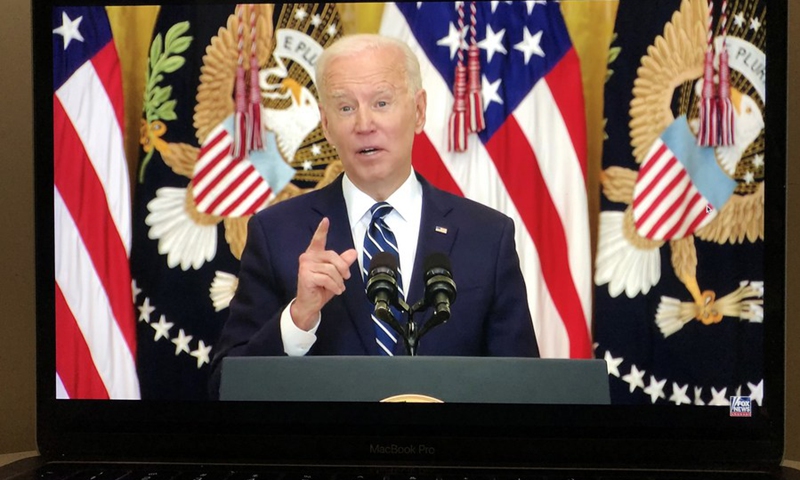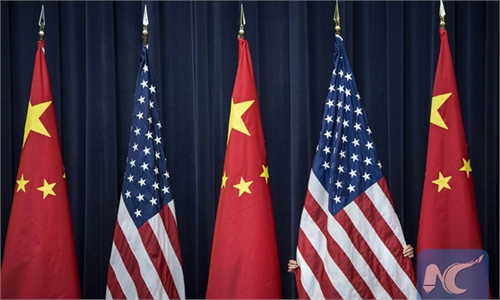
Photo taken in Arlington, Virginia, the United States, on March 25, 2021 shows a screen displaying U.S. President Joe Biden speaking during a press conference in Washington, D.C., in a live stream provided by Fox News.(Photo: Xinhua)
Almost 100 days have passed since US President Joe Biden came into power, and his overall strategy for China is still under evaluation. However, the US strategic circle has been trying to shape the administration's strategic framework for China, proposing ideas such as "competitive coexistence" and "competitive interdependence."Although the two major parties in the US have differences on specific policy issues, their overall strategy for China has basically inherited the characteristics of the Trump era after four years of Trump administration. In the US, strategic competition seems to have become the common expectation of China-US relations.
Although the Biden administration has not clearly launched a formal China strategy, it has already regarded China as the most serious competitor and biggest geopolitical test of the 21st century. There is no essential difference compared with the Trump era. But under this strategic goal, Biden has quickly adjusted the way of competing against China.
First of all, Biden is emphasizing that the US competition with China begins at home. He has announced domestic policies to control the epidemic and stimulate the domestic economy, and promoted foreign policies that serve domestic demands, and strengthening competitiveness against China.
Second, Biden highlights the ideological struggle against China. He has focused on attacking China on issues concerning democracy and human rights, and brought in allies to add pressure on China on issues that matter to China's core interests such as Hong Kong and Xinjiang.
Third, Biden is consolidating the alliance system. He has repaired alliance relations, and jointly smeared and sanctioned China with allies.
Fourth, he is seeking to prevent China from dominating the international rules-making process. The US has quickly announced its return to the Paris Climate Agreement and the World Health Organization to ensure the promotion of multilateralism when Washington's interests are guaranteed. It is also seeking to seize the power of global governance once again.
Finally, the US does not want to give up its engagement with China. During the China-US high-level talks in Alaska, Washington released signals to maintain and strengthen communication and coordination with China in many areas. These include economy, trade, health, cyber security, climate change and Iranian nuclear issue.
There is nothing wrong with the US competing with China, but it should be a race during which one competes with another so that both can improve together. It will be welcomed by the world if Washington maintains positive and healthy competition with other countries in global governance. It will also be welcomed if it provides more public goods instead of implementing selective multilateralism.
However, the US increasingly interprets competition among major powers as "zero-sum" on both ideological and economic levels. It links strategic competition with the maintenance of its hegemony, which will accelerate the "Trumpization" of the US' China policy.
Learning from history, a zero-sum competition can only lead to the tragedy of great power politics. Maintaining relations between great powers can not only keep the international order, but also create opportunities for cooperation and overcome common challenges in times of global crises.
Within Biden's tenure, competition and cooperation will co-exist and become the new normal in China-US relations. The two sides must ensure that competition is healthy and fair and define the rules, means and bottom line of competition. They should enhance communication to ease doubts and raise reasonable concerns. They should also think and design the strategic framework of the bilateral relationship without being taken hostage by strategic competition distractions.
Therefore, the Biden administration should not become "Trumpinized" and indulge in a zero-sum strategic competition. Rather, it should engage in rational policymaking and focus on cooperation. It can be seen that the Biden team are more experienced and rational than the Trump team. Although it echoes Trump's rethinking of China-US relations, it believes that relations should not slide into a direct confrontation, or both will bear the negative consequences.
The phone call between Chinese President Xi Jinping and US President Biden, the bilateral talks in Anchorage, and US climate envoy John Kerry's visit to China prove that both sides are willing to promote the communication between the two countries. It also shows that the US wants cooperation in regional and global agendas, which is expected to help offset the tensions between the two nations.
For the Biden administration, accepting a confrontational strategic and competitive framework with China is the easiest road. But managing divergences with a more delicate manner and having more patience and energy to expand cooperation is the very option that will benefit the two countries and the world as well.
The author is an assistant research professor at the Institute of American Studies, China Institutes of Contemporary International Relations. opinion@globaltimes.com.cn



